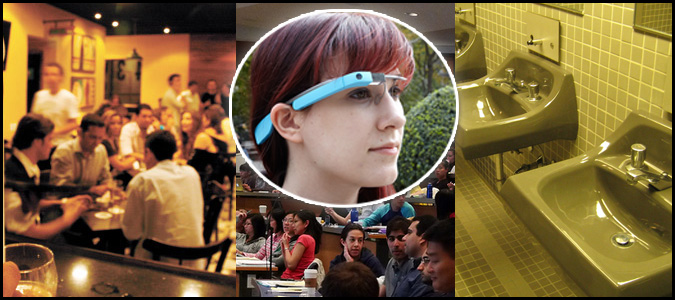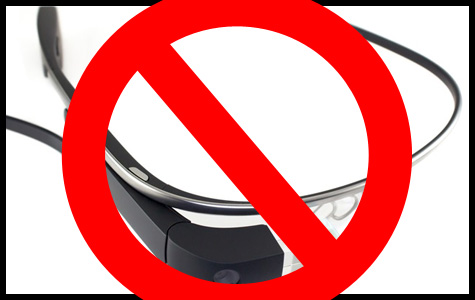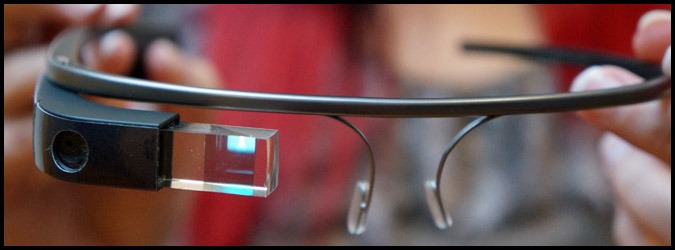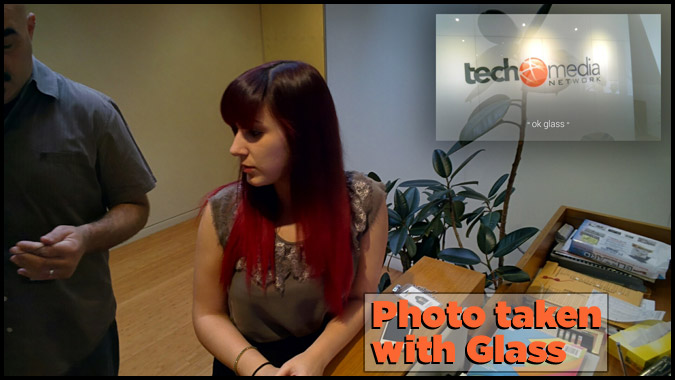Glasshole or Not? 7 Urgent Ethical Dilemmas for Wearable Tech

Every truly disruptive technological advance leads to its own set of ethics standards . Who worried about interrupting someone's dinner or overpaying for psychic friends before Alexander Graham Bell invented the telephone, or annoying family before texting took off?
Even with Google Glass available to just a few thousand people, society is already debating whether it's OK to bring a wearable computer into a bar or place one on your head while driving. As next-gen wearable computers provide augmented (aka "augmediated") reality features that can add or subtract information from your view, even more questions arise as to how this technology should and shouldn't be used. We asked some of the leading minds in ethics, computing and privacy to answer the stickiest moral problems the world will face when wearable tech is as ubiquitous as smartphones are today.
1. Should I be able to wear digital glasses everywhere I go?
A number of bars and casinos have already explicitly banned Google Glass due to privacy concerns. However, these same businesses wouldn't dare to ban smartphones — all of which take photos — because everyone carries them. Should there really be no-Glass zones?
MORE: Top Google Glass Alternatives
"People are surprising and don't always end up acting rationally," said Jules Polonetsky, executive director and co-chairman of the Future of Privacy Forum, a Washington, D.C.-based think tank. "Sometimes, the things you think are going to be intrusive end up being well accepted." Polonetsky pointed out that technologies such as portable Kodak cameras and caller ID both sparked huge privacy concerns (Kodak cameras were banned in many public places) when they were introduced, but were quickly accepted.

"We need laws restricting the restrictions on digital eye glass," said University of Toronto professor Steve Mann, who is widely considered the father of wearable computing and has been wearing his homemade "EyeTap" goggles for 30 years. Mann believes that his digital eyeglasses are part of him because they help him to perceive the world, similar to the way hearing aids and prescription lenses help others.
"Forbidding DEG (digital eyeglasses) is a much stronger affront to bodily integrity than merely forbidding regular prescription eyewear," he writes in an upcoming op-ed in MIT Technology Review.
Stay in the know with Laptop Mag
Get our in-depth reviews, helpful tips, great deals, and the biggest news stories delivered to your inbox.
2. Can I record anything and everything I see?
Nobody stops you from remembering what you see, and if you have a photographic memory, you might as well be recording. However, because digital memory is much more accurate, being recorded makes a lot of people and institutions uncomfortable. Will we get used to being recorded by friends?
Randy Cohen, who started the New York Times Ethicist column and has written two books on ethics, said that recording your time walking around outside is fine, but capturing your interactions with other people is wrong, unless you explicitly tell them that you're filming.
"I think it's wrong to do, and it's some kind of deceit," Cohen said when asked about recording your conversations. "That's what the ethics hinges on. Is it a kind of deceit? And I say yes, because the assumption that you're not being recorded is so embedded in our social interactions."
However, in the cyborg future, Cohen believes that capturing one's intimate conversations may be as acceptable as keeping a private, written diary today. "I think we will become more comfortable that someone may make a visual and audible recording of what happened, as long as it's for their own use," he said. "There's no obvious harm until another person is shown those images, beyond that sense of being a little inhibiting for social interaction."

To Mann, the digital memories you can record with your wearable computer are equivalent to human memories, essential both for you as an individual and for the public good. In a recent TEDx talk, Mann advocated for what he calls the "souveillance" — the ability to record your surroundings for personal security and public integrity. Mann pointed to several incidents in which people had captured police malfeasance on their personal cameras, even though footage from police cameras had been doctored.
Mann believes that neither the government nor businesses should be able to use footage from surveillance cameras as evidence in court unless they also allow people to make their own records — a concept he calls the "Veillance Contract." "Why must we protect the welfare of candy on a department-store shelf with cameras, but people can't have cameras to protect themselves and their own bodies?" he asked.

Cohen agrees that there needs to be more transparency, but in order to protect government or trade secrets, it is sometimes morally acceptable to undergo video surveillance without the right to record on one's own, he said.
"There are legitimate trade secrets, and let's say I get to take a tour of the Apple labs and they have security cameras within the lab — I don't think it's unreasonable for them to say that I still can't bring a camera in and record what goes on in the lab," Cohen said. "That demand for symmetry doesn't apply universally ."
3. May I bring Glass to class, even during exams?
If wearable computers become your extended memory, why should you have to remove them, even during exams? Is the goal of the exams to test your human memory, even when your digital memory will be on your head all day, every day?
Mann tells his students that they can keep their digital glasses on during exams and use any notes they've taken or calculation systems they've designed. However, he asks them not to connect to other students' glasses.
MORE: 12 Gadgets Ahead of Their Time
"It depends on the nature of the particular thing you're learning," Cohen said. "There are some kinds of math classes where the professor will allow you to have a list of certain formulas or allow you to use a calculator because they're testing for something else; they're trying to teach you something else, and those things actually improve learning."
4. Can I change your appearance in my glasses?
Today's smartphone camera software already makes significant changes to your images. Samsung's eraser feature makes unwanted people disappear from your photos. In the future, you may be able to unfriend someone and literally never see him or her again. You may also be able to never see your wife's ugly birthmark or your husband's love handles as long as you wear your digital eyeglasses. Is that wrong?
"If it only involves your viewing, it seems to me you're entitled to view any way you want to," Cohen said. "Although, the more you alter the traditional ways of viewing, it seems to me you're putting yourself in peril, and you're limiting your experience. And you will, one way or another, have a debased experience. It will impair your ability to understand human beings."

However, Cohen said that if you share your altered-perspective images with others, you will bear the same ethical burden as photo journalists do today. "The photographer or videographer's duty is to present a truthful, insightful display of reality as he or she knows it, but that's unbelievably subjective, but unavoidable," he said.
Mann has a similar view. "Beauty is in the EyeTap of the beholder," he said.
5. Do I have to give you my undivided attention when I have the Internet beaming data into my eyeball?
Today, people glance at their smartphones while sitting at a family dinner, in a business meeting or supposedly having an intimate conversation. However, it's common to be shamed into paying attention because people notice if you're looking down at your device. What happens when everyone's wearing digital glasses that beam the text messages, emails and Facebook alerts right into their retinas 24/7? Will it become socially acceptable to divide your attention between the real world and cyberspace?

About.com Etiquette Expert Debby Mayne believes that old-fashioned manners still apply to futuristic technology, and require you to give your conversation partners 100 percent of your attention, or to at least let them know that you're distracted. "When speaking to someone in person or on the phone, it's essential to give your undivided attention," Mayne said. "However, if you must multitask, let the person know, and give him or her the option of talking later. Technology should augment relationships and reality, not take the place of them."
Cohen said that expectations are changing and that younger adults don't consider it rude to look down at your phone or into your digital glasses in the middle of a conversation, particularly if it's a group conversation. However, he posited that this short attention span is ruining interpersonal relationships.
MORE: Google Glass vs. Smartphone: Which is Faster?
"If you want to engage with other people, you have to engage with other people," he said. "If you're constantly looking away and distancing yourself from it, you will have a far shallower, more disjointed connection. It will be less intimate; it will be less insightful; it will be less tender; it will be less loving."
6. Is it rude to Google someone while looking right at them?
How many times have you Googled someone to learn more about him or her before talking in person? Reading someone's Facebook wall or LinkedIn profile can help you make small talk about their personal lives or better understand their professional background. But what happens when your digital eyeglasses do face detection and immediately show you the name, résumé and last five tweets from the person on the other side of the room?
Cohen said making small talk based on information you just grabbed from the Internet is unethical because it implies that you care more about someone than you actually do. If you congratulate a business contact on his daughter's graduation only because his Facebook wall just beamed into your eye, you're feigning a connection.

"It's a problem of deception that the traditional version of that interaction suggests that the possession of that information is an indicator of how much value you place on the information and how much value you place on the person ," Cohen said. "Oh, you remembered my child's birthday? That says something about your feelings about me — that you care about me."
However, Cohen noted that, in the future, simply remembering someone's personal details will stop being an indication of how you feel about them. When people expect you to read their online information in real time, having that information stored in your human memory won't be any more valuable than retrieving it from the cloud or your digital memory.
For Mayne, it's all about informed consent. She said that, if you must Google someone while talking with them, ask them if it's OK to search for them. However, it's hard to imagine something more awkward than telling a person "I'm reading your Facebook wall now so we'll have something to talk about in five minutes."
7. Should I view what my child is seeing in real time?
If you think there are helicopter parents today, just wait until the kids are wearing cameras on their heads. In a future where you can capture a first-person, real-time video of everything you see, is it OK for parents to tap into their kids' feeds to see what they're doing all day?
Cohen said that, while parents have a responsibility to keep their children safe, it's wrong for parents to spy on their kids' activities, unless they have a reasonable suspicion that the child is in serious danger.
"It says that I don't trust you, and it undermines the parent-child relationship," Cohen said . "I can imagine very extreme cases when you've tried every other measure and you have a reasonable belief that your child is an imminent danger to him or herself or to other people … where out of desperate concern for your kids' safety, you engage in a more intrusive form of monitoring. We're talking very extreme and rare cases."

